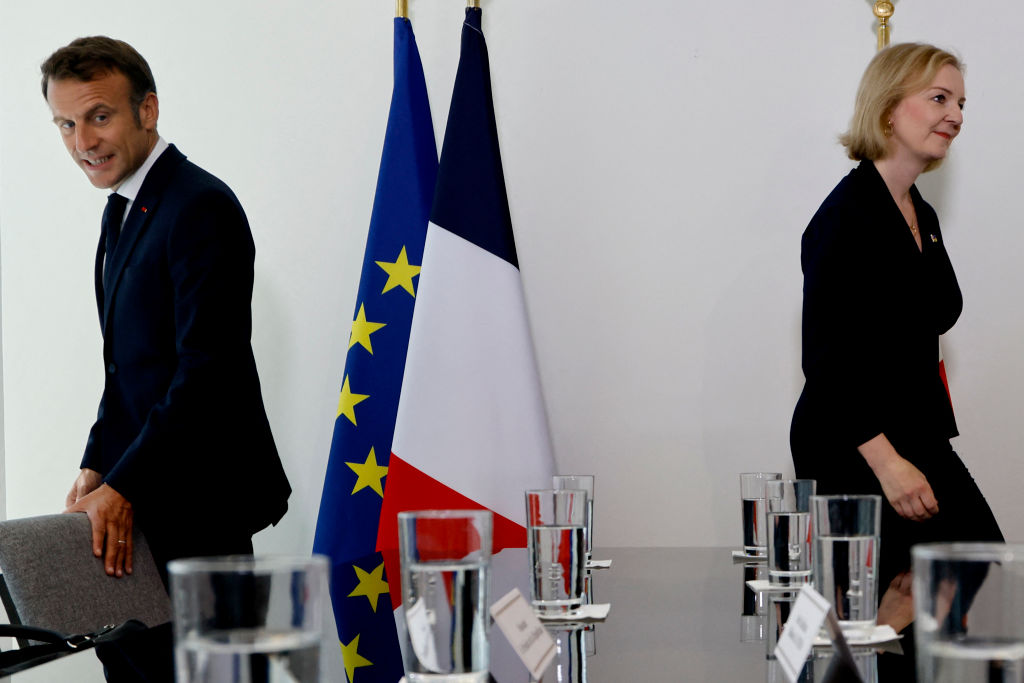Since Brexit, Britain and France appear to have drifted apart. Leaders from both countries have engaged in an on-off war of words. But despite these political fractures, Britain and France have actually come to resemble each other more closely than ever. It is now difficult to differentiate the economic, financial, social and political conditions that exist on both sides of the Channel.
France and Britain face a wave of strikes over the coming months. After a lull over the summer, Gallic workers are once again walking out: public sector and railway worker unions staged a national strike for wage increases last week. Even moderate unions are now threatening mass stoppages if Macron continues his labor reforms. Meanwhile, in Britain, months of cost of living strikes across all economic sectors has aligned the UK with French habits. These walkouts could become increasingly political like France’s when the Truss government attempts to implement its proposed trade union and strike reform.
Politically, Macron’s minority government is forced to negotiate each legislative bill in the teeth of vociferous party opposition. But his last term is steeling him to implement those labor reforms reiterated in his recent election manifesto. His great fear is becoming a lame duck president like Jacques Chirac’s second term after 1995. Chirac notoriously dissolved parliament in 1997 hoping to win a larger majority only to be saddled with a socialist cohabitation. Last week, Macron said he would dissolve parliament if his pension reform bill faces a parliamentary censure motion, as threatened by opposition parties. Marine Le Pen welcomed the news gleefully: “chiche” (“bring it on”), she said. Le Pen calculates that elections could boost her 89 députés and force Macron to call on her as prime minister.
Macron’s great fear is becoming a lame duck president like Jacques Chirac.
The UK political situation is not so dire, but it could become so. Prime Minister Liz Truss is relatively isolated within her own Conservative party: most Tory MPs didn’t support her leadership campaign. Only a few weeks after she took office, she’s already encountering mounting opposition from her own benches: today’s U-turn, in which she withdrew a proposed cut to the UK’s top tax rate after initially supporting it, came after more than a dozen Tory MPs said they wouldn’t support the measure. If she continues to face similar opposition to her mini-budget, she might be forced to reach for some of the radical measures employed by Macron.
There are also plenty of economic parallels between France and Britain. Europe’s second (the UK) and third (France) largest economies, continue to eke out minimal growth. France may have slipped from sixth to seventh in world GDP rankings, overtaken by India, with Britain hanging on to fifth place by its fingertips, but the gap between the two economies is a mere bagatelle.
It’s a similar story when it comes to inflation, even if France is doing a better job than Britain of keeping tabs on this. French inflation is 6.2 percent; Britain’s is 9.8 percent (Germany’s just hit 10.9 percent). France’s inflation success is partly explained by Emmanuel Macron’s now wise decision back in May — albeit for electoral reasons — to cap energy prices by forcing its national electricity provider EDF to absorb the hit (now in deficit by 44 billion euros or $43.2 billion) and for the government to give 55 billion euros ($54 billion) of subsidies to households and business to off-set energy costs. Playing catch-up and following in Macron’s footsteps over the rising cost of energy, Liz Truss’s government was forced to introduce a £60 billion ($68 billion) energy support package for households and business last month. This came at the same time as tens of billions of pounds of tax cuts. As a result, debt will balloon, although there is some reassurance for the UK: Britain’s debt to GDP ratio is the lowest in the G7 at some 95 percent, and remains lower than France’s at 115 percent debt to GDP.
But it’s not all good news for the UK: both Britain and France have record balance of payments deficits and are running exorbitant budget deficits (GB 7.1 percent, France 5 percent and rising). In France, Macron has been steadily whittling down the top rates of personal tax (to 48 percent), has reduced business taxes and refuses to impose a windfall tax, despite public outcry. He and his finance minister, Bruno LeMaire, insist that all will be financed by economic growth. His measures appear to have inspired Liz Truss, who has opted for a similar fiscal package despite some measures clearly being unpopular with voters.
So while British and French politicians might not like to admit it, there are striking resemblances between their two countries. Those who try and attribute Britain’s current woes to Brexit should take note and realize that many of the UK’s problems are shared by France. Both countries are undergoing similar macro economic and financial pain and appear, woefully, to be taking the same political path.
This article was originally published on The Spectator’s UK website.

























